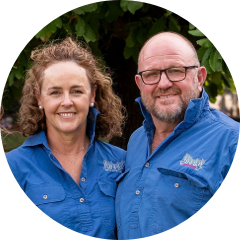WHY THIS PROJECT IS IMPORTANT
The SCOUT: Loam Bio project brings cutting-edge microbial technology into real-world farming systems to test its potential for increasing soil carbon, improving productivity, and unlocking new income opportunities through carbon farming. By combining rigorous small-plot research with on-farm strip trials, the project aims to deliver independent, locally relevant evidence on where and how Loam’s CarbonBuilder™ performs best. Working closely with growers, technical experts, and Loam Bio’s product team, we are building the knowledge base needed to guide adoption decisions with confidence, ensuring this emerging technology delivers tangible benefits for farmers, soils, and the climate.
This project explores how Loam Bio’s microbial seed-treatment and carbon farming system can be validated under real farm conditions in the Riverine Plains region, assessing agronomic, economic and soil-carbon outcomes.
Why this project is important
Broadacre cropping systems face a dual challenge: sustaining productivity under climate volatility while contributing to emissions reduction goals. Traditional carbon farming practices often struggle in cropping systems to generate stable soil carbon at scale. Loam Bio’s CarbonBuilder™ technology is a next-generation microbial seed inoculum designed to drive stable carbon sequestration (via mineral-associated and aggregate carbon pools) while delivering agronomic co-benefits such as improved nutrient cycling, water retention and yield resilience.
Through our SCOUT program, Riverine Plains aim to ground-truth Loam’s technology under local soil, climate and management regimes, and evaluate its viability as not only a carbon farming strategy, but also a tool to increase system efficiency and productivity for Riverine Plains’ growers.
Project objectives
- Validate CarbonBuilder™ performance in Riverine Plains soils across key crops (canola and wheat in local trials)
- Quantify soil carbon responses (ΔC)
- Assess agronomic impacts (yield)
- Develop local case studies and information pack for growers
- Inform scale pathways, adoption barriers, and refinement needs from farmer feedback
Focus areas
- Understanding microbial trial design and performance: CarbonBuilder™ is one of several cutting-edge microbial products emerging globally that claim to improve soil carbon storage and crop performance. Validating these technologies under local farming conditions is critical to building grower and advisor confidence. This project focuses on robust trial design, clear performance metrics, and independent testing so that on-farm decisions are guided by evidence rather than marketing claims.
- Understanding the challenge: Most carbon in cropping soils cycles rapidly through microbial and plant residues, offering limited long-term climate or soil health benefits. New microbial technologies like CarbonBuilder™ aim to increase the proportion of carbon stored in more stable soil pools, such as mineral-associated and aggregate-protected carbon. If proven effective, this could open significant opportunities for carbon farming, soil health, and potentially reduced input needs. However, these claims must be validated across different soils, climates, and farming systems before broad adoption.
- Early-stage validation: Riverine Plains is trialling CarbonBuilder™ through both small-plot research trials and larger strip-scale paddock trials. This combination enables rigorous scientific testing under controlled conditions, while also reflecting the realities of commercial farm operations. By collaborating with other trial providers nationally, the project captures data across diverse environments to better understand where and when the technology performs best.
- Stage-gate support: The project uses a “stage-gate” approach, setting clear success thresholds across biological (e.g., carbon accumulation), agronomic (e.g., yield, stress resilience), and economic (e.g., payback, risk) metrics. Working alongside Loam Bio’s product development team and independent technical experts, we are focused on identifying not just whether the technology works, but under what conditions, and with what reliability and return on investment for growers.
- Grower engagement: Adoption depends on more than science alone. We are engaging closely with farmers to understand their experience with the product, barriers to adoption, and the type of information they need to make informed decisions. Building this body of data and grower insights early ensures that future extension efforts are grounded in both robust science and practical realities.
Find out more
For further information about this project, please contact Riverine Plains CEO, Pip Grant by emailing ceo@riverineplains.org.au.
Project investment
This project is funded by Loam Bio and the Victorian Drought Resilience Adoption and Innovation Hub.
Partners
Focus areas
MORE ON Grains & Sustainability
Our research enhances food production, increases environmental resilience and improves community connection across the Riverine Plains. See how our research creates impact.
-
Business
Sustainability
-
Livestock
Sustainability
-
Grains
Business
-
Grains
Sustainability
-
Grains
Livestock
-
Grains
Livestock
-
Soils
Sustainability
-
Soils
Sustainability
-
Grains
Sustainability
-
Grains
Business
-
Sustainability
Drought
-
Sustainability
-
Grains
Sustainability
-
Grains
-
Grains
-
Soils
Grains
-
Soils
Sustainability
-
Grains
Soils
-
Drought
Grains
-
Soils
Grains
-
Grains
-
Grains
Soils
-
Soils
Grains
-
Fodder
Grains
-
Grains
-
Soils
Sustainability
-
Grains
-
Soils
Sustainability
-
Grains
Soils
-
Sustainability
Grains
-
Grains
Sustainability
-
Soils
Grains
-
Grains
Sustainability
-
Livestock
Grains
-
Grains
Soils
-
Sustainability
Grains
JOIN RIVERINE PLAINS
Riverine Plains provides opportunities to see new research and innovation, connect with rural communities, and attend informative events.


